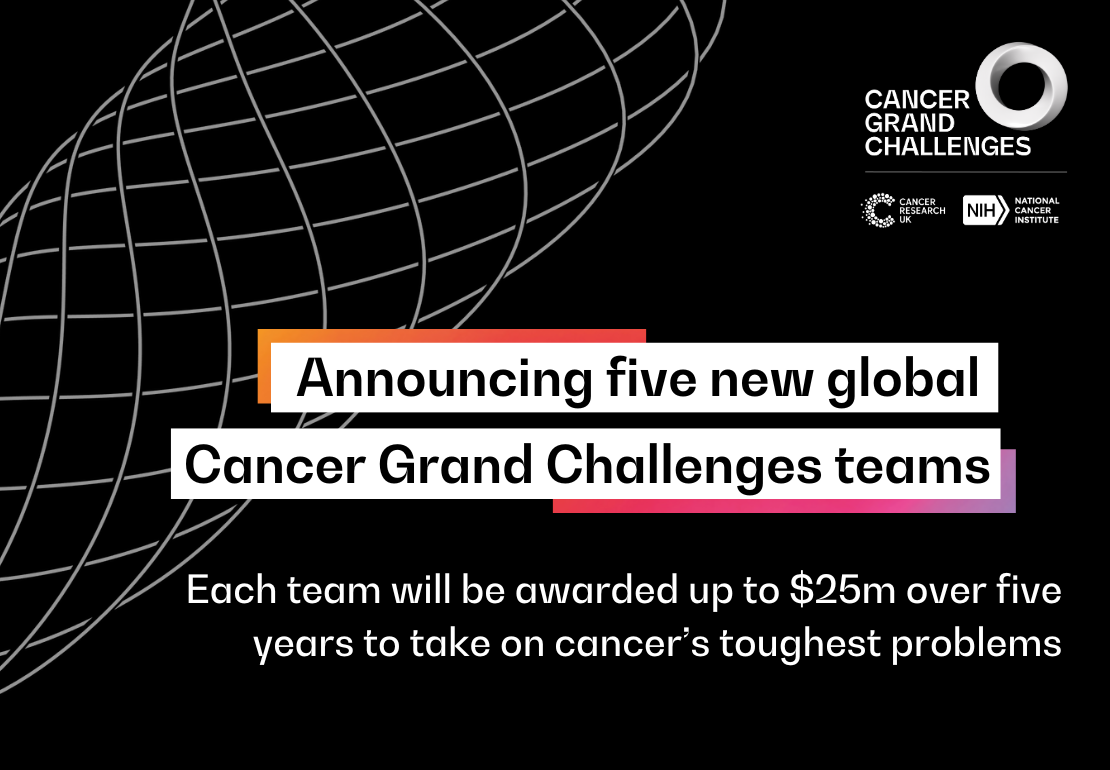Today we’re excited to announce the five new global teams that have been selected to each receive up to $25m in Cancer Grand Challenges funding over five years to take on four of cancer’s toughest challenges.
In March 2023, we announced nine new challenges to the global cancer research community. After receiving applications from 176 world-class global teams that proposed bold ideas to tackle these challenges, and followed by a competitive process of shortlisting, full applications and interviews, we are pleased to be funding five new teams to take on four challenges.
“Some of these challenge areas have been massively under-investigated,” says Professor Sir David Lane, chair of the Cancer Grand Challenges Scientific Committee. “Now it’s time for the teams addressing these challenges to shine and to bring the full power of global team science to bear on the work that lies ahead.”
Representing a total of $125m over five years, this is the largest investment we have made in a single funding round to date. The members of the five new teams join our growing global community, which now stands at over 1,200 investigators and collaborators spanning 92 research institutions across 16 countries.
Team KOODAC
The KOODAC team will be tackling the Solid Tumours in Children challenge. Co-led by Professor Yaël Mossé (Children’s Hospital of Philadelphia, US) and Professor Martin Eilers (University of Würzburg, Germany), KOODAC will harness the technologies of targeted protein degradation to target the oncoproteins that drive high-risk childhood solid tumours. The team aims to develop orally bioavailable drugs that will dramatically improve cure rates for children affected by these cancers.
“We bring together an international group of experts in five of the most potently transforming oncoproteins that define high-risk paediatric malignancies, with leading experts in the field of targeted protein degradation and an international team of patient advocates to develop a new class of drugs for children with solid cancers,” says Yaël.
Team MATCHMAKERS
The MATCHMAKERS team will be taking on the T-cell Receptors challenge and is led by Dr Michael Birnbaum (Massachusetts Institute of Technology, US). By harnessing advances in high-throughput approaches and computational prediction, MATCHMAKERS will take an integrated approach to understand and predict how T cells recognise tumours, paving the way for personalised immunotherapies.
“T cell-based therapies for cancer are saving lives, but typically we don’t know what the T cells target in a tumour, and how it differs in those who respond to treatment versus those who don’t,” says Michael. “This cancer grand challenge was a perfect opportunity to dream big and put together a team with the scope, expertise and talent needed to solve the question of T cell recognition.”
Team PROSPECT
The PROSPECT team will be taking on the Early-onset Cancers challenge, focusing on early-onset colorectal cancer (EOCRC). The team is co-led by Professor Andrew Chan (Massachusetts General Hospital, US) and Dr Yin Cao (Washington University in St. Louis, US). PROSPECT will employ a disruptive, transdisciplinary approach spanning cells, individuals and populations to uncover the mechanisms linking lifetime exposures to EOCRC, and test new strategies to combat this cancer type.
“Our team has been at the forefront of identifying risk factors for early-onset colorectal cancer, yet it remains unclear which causal risk factors collectively lead to the increasing incidence globally and how to reverse the trend,” says Andy. “This critical mission demands a transformative shift in our approaches to identifying causal risk factors, which is only feasible through the support and scope provided by Cancer Grand Challenges.”
Team PROTECT
The PROTECT team will be tackling the Solid Tumours in Children challenge and is led by Professor Stefan Pfister (Hopp Children's Cancer Center Heidelberg (KiTZ), Germany). Utilising innovative approaches involving targeted protein degradation, the team aims to establish a platform to develop and test drugs targeting the undrugged drivers of childhood solid tumours. Its vision is to develop the next generation of therapeutic approaches for children with cancers of unmet clinical need.
“Fuelled by the urgent need to develop therapies specifically tailored towards the biology of cancers in children, this unique grant offers the opportunity to implement research that has the potential to bring about transformative changes in this space,” says Stefan. “Collaboration with diverse disciplines such as chemistry, biology, medicine and computer sciences and a multidimensional approach has ignited fresh perspectives and sharpened our focus on the challenge.”
Team SAMBAI
The SAMBAI team is tackling the Cancer Inequities challenge. Led by Professor Melissa Davis (Morehouse School of Medicine, US), SAMBAI will generate a comprehensive database with measurements of social, environmental, genetic and immunological factors that cause and influence disparate cancer outcomes in underserved populations of African descent. The team will focus on breast, pancreatic and prostate cancers. SAMBAI hopes its findings will inform policies and generate opportunities for intervention specific to these populations.
“Disparities, driven by inequities, have persisted despite decades of research, but haven’t been addressed at this scale before,” says Melissa. “A global and interdisciplinary approach will allow us to build a comprehensive cohort of harmonised data paving the way for more accurate precision interventions that are effective, particularly for minoritised populations who have been underrepresented in cancer research.”
For the first time, Cancer Research UK has partnered with France’s Institut National Du Cancer and KiKa (Children Cancer Free Foundation), who are each contributing to the funding of two teams. This funding round was also made possible with the support of the Scientific Foundation of the Spanish Association Against Cancer, the Bowelbabe Fund for Cancer Research UK and The Mark Foundation for Cancer Research.
